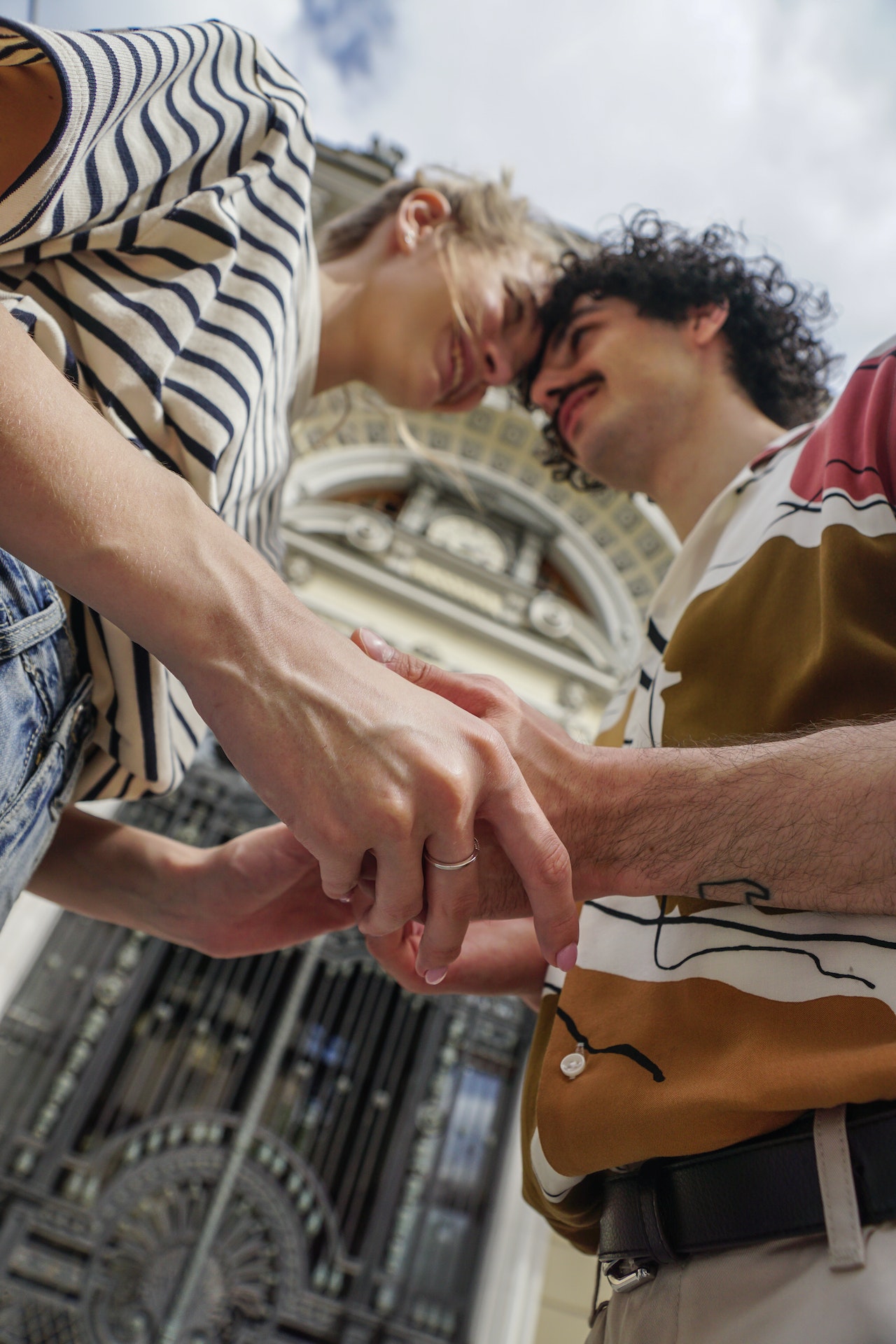Being a human is hard some of the time, and being a human who is online dating can be hard a lot of the time.
After a seven-year relationship ended, I ventured back to the online world and found a different version of myself in a different version of the dating world. A lot happened in the online dating world between 2005 and 2017—the year of my triumphant return. There was swiping, there was ghosting, and there were dick pics.
A lot happened in the world of Kate between 2005 and 2017 too. There was a breakup, there was a move to Florida, there was meditation, and there was Buddhism.
Scrolling back in time, my own 2005 Match.com profile included a picture of me hugging a tall boy of PBR (my drinking days are behind me), a tagline of “seeking external validation” (painfully true, but something that I am now actively resolving to work on), and narrow settings on who—or just as importantly where—I wanted my potential suitors to be (to be fair, within 25 miles made sense because more than 15 miles in Los Angeles was practically a road trip…if you know LA, you know this truth).
I will not look back too long on that train wreck version of dating Kate, but I do remember also sitting with friends in front of my laptop just ripping men to shreds—some just for the fun of it and some from a defensive stance of unrequited matching.
Resentment, judgement, and hopelessness had all permeated my prior online dating life, yet now I was a more aware, more mindful human who wanted to be in alignment with my values on my meditation cushion and yoga mat, and one who wanted to bring those tools not only to my daily life, but to my online dating life as well.
One of the first things I learned in my Dharma teachings were the four immeasurables—the wholesome attitudes that help you cultivate a Bodhicitta, or an awakened heart. Having an awakened heart seemed like a good place to start with this whole alignment thing, so I have deliberately attempted these four attitudes to guide my swiping and sometimes eventual real-life dates.
I need to mention that, for me, none of this evolved approach to dating could happen without an important change that happened in those 12 years. Whether I’m lying on my couch swiping or actually sitting across from a real, live person on a date, I find that all four of these practices are better accomplished as a sober person. I need to be mindful, not have my mind full of booze during all steps of the dating process. I need to be discerning, and my discernment goes out the window with even a drop of alcohol in my system (see most of my previous relationships for examples). They call them beer goggles, not discernment goggles, after all. I realize that alcohol may be an integral part of dating and mating rituals, but this is the path I’ve chosen in this regard.
So, sober and mindfully, I practice one of the four immeasurables which is upeksha/equanimity, a tricky one, both in my understanding of it and the actual practice. My English-speaking brain always wants to interpret this as level-headedness. So, of course, it’s great to be level-headed when it comes to dating—and life, in general.
If we look at this from an interpretation of detachment from fluctuating states of emotions, then it helps inform the practice of dating a little more for me. How peacefully and evenly can I respond when someone’s profile pic shows them donned in a MAGA hat? How peacefully and evenly can I respond when a date that I thought went really well ends with ghosting? Without anger, judgement, or resentment, can I repeat my mantra “Not for me” or flip it and identify that maybe I’m “not for you”? The “Not for me” and “not for you” mantras have really helped with gracefully moving through disappointments and rejections that naturally arise from dating.
On the flip side, there’s also a level of evenness that I like to find when a date goes really, really well. Instead of hopping on a one-way train to storyville, I remain present and calm. The 2005 Kate would most likely end a good first date with a text to a friend saying, “Oh my god. Pick out a bridesmaid dress. I just met my husband,” or some other hyperbolic response to “How did it go?” It took me a lot of train rides and a couple of dharma talks on attachment to learn that that train to storyville actually had a final destination of disappointment. Another phrase that I learned on the spiritual path comes in handy here: expectations are planned disappointments.
Another immeasurable is called metta in Pali and maitri in Sanskrit; in English, we call this loving-kindness. We wish each other well; sounds simple, right? Can I go beyond saying “Not for me” when I’m swiping left and actually wish that person well? Or if I am not for you and you disappear into the ether, can I also implement that practice?
I love what the wise Ethan Nichtern said in his book, The Dharma of the Princess Bride: What the Coolest Fairytale of Our Time Can Teach Us About Buddhism and Relationships: “Perhaps in an enlightened society…the first thing you might say to each other is ‘So this is really hard, right? Let’s try to be decent humans to each other, okay?” I have this little passage saved in my phone, and every time I read it, I do feel a sense of loving-kindness for all those that I maybe never matched with, matched with and messaged, or matched with and met on a date because we are all in this boat together—putting ourselves out there and doing this brave thing.
Karuna is one of my favorite Pali words, and it means compassion. What’s the difference between compassion and loving-kindness? Not only do I want you to be happy, but I also want you to be free of suffering. If I’m being honest, 2005 Dating Kate did not wish the handsome, bearded landscape architect who lived right on the Santa Monica steps well after two months of dating.
That version of Kate wished that he would also get his heart crushed as he crushed hers when he told her that he did not want to see her now (in retrospect, I have a lot of respect for him actually calling me to tell me this and not texting or ghosting me). Fast forward to 2019, Kate who actively believes that even if things do not work, I do want the person to be happy. I want everyone to be happy because then this whole world will be a better place. Per Facebook stalking of the landscape architect, it looks like he ended up pretty happy, and I am happy that his heart is still seemingly intact.
When most people think of dating, they don’t typically think of mudita/joy, the last immeasurable. Usually, any time someone talks to me about their online or real-life dating experiences, it’s accompanied by sighs and groans. I get it. But as a practicing Buddhist, I know it’s all perspective.
I do love to find the joy in any experience I had—whether it’s from learning something new about myself (per a Jesus Christ/Kurt Cobain/Brad Pitt look alike, I drive too fast), someone else (men are self-conscious about their bodies too), or the world (in Bhutan, Buddhists contemplate their own death multiple times per day, and they have the highest gross national happiness); having a hearty laugh (I spent five minutes trying to figure out why a French man was calling something “meanie” when he was really just trying to say it was mini); eating some kind of delicious food (tomato soup with grilled cheese croutons? Yes, please!); or, on the rare occasion, briefly relishing the warmth and touch of another human being (le sigh).
There’s joy everywhere, even on Bumble; you just need to start figuring out where and how to look.
So, before I enter that first date awkward moment, I take a pause, take a breath, and check to make sure that I’m bringing the upeksha/equanimity, maitri/loving-kindness, karuna/compassion, and mudita/joy along. I try to fully show up in all my “Kateness” and let things unfold as they will, not as I want them to.
No matter how things turn out, I pat myself for being a brave human on this journey. When people ask me if this approach and online dating has been successful for me, I first giggle to myself (after I ask them to define success, which to most would mean that the apps have been deleted), and then remember a quote that I saw on a tea bag once and slightly adjust it:
“What’s the difference between a bad date and a good date? Perspective.”
~
Please consider Boosting our authors’ articles in their first week to help them win Elephant’s Ecosystem so they can get paid and write more.









Read 12 comments and reply